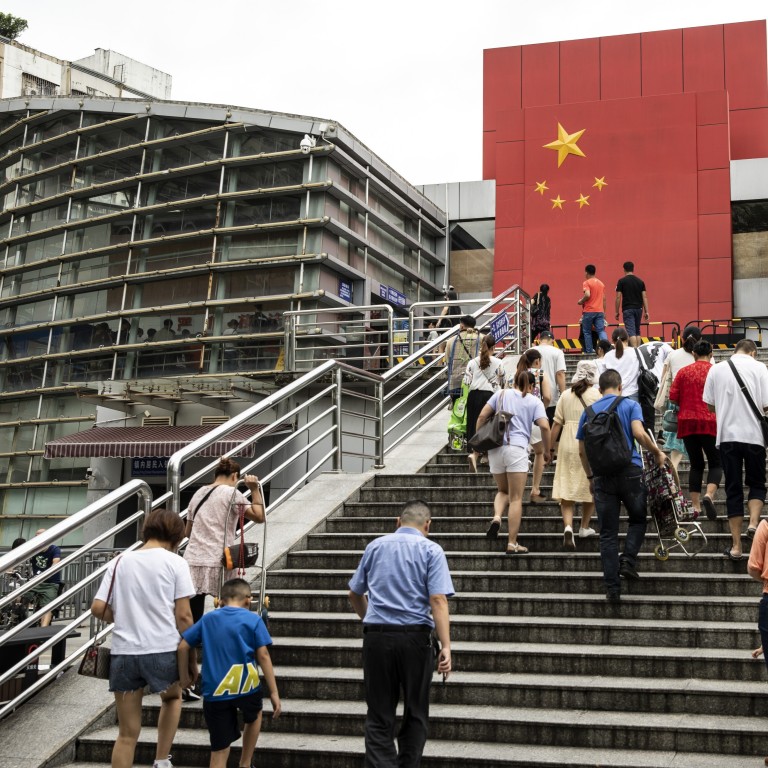
Hundreds from Hong Kong, Macau apply for five civil service openings in Shenzhen created under Greater Bay Area plan
- The positions in mainland China pay less than local government posts, but pro-establishment figures call it a ‘golden opportunity’ to build networks
- The weekend applications come two months after President Xi Jinping urged Hong Kong youths to spend time living and working across the border
A total of 446 candidates with residency in either Hong Kong or Macau took part in a written test organised by the Shenzhen government over the weekend, the Chinese News Service reported, with pro-establishment figures saying it was no surprise hundreds had applied.
Horace Cheung Kwok-kwan, vice-chairman of the Democratic Alliance for the Betterment and Progress Hong Kong (DAB), said: “I trust it will be a golden opportunity for our youths to understand the mainland system and build up their personal networks.”

But Carson Tsang Long-hin, spokesman for student activist group Ideologist, questioned whether it revealed an eagerness among Hong Kong youths to cross the border or if it was largely applicants with local residency who already lived on the mainland.
The news report did not break down the number of candidates from Hong Kong and Macau, nor did it mention where candidates were currently residing. Stringent anti-coronavirus measures have discouraged cross-border travel by Hongkongers in the past year.
The five positions – among the 1,069 places announced by the Shenzhen government for mostly mainland graduates in November – were launched as part of an initiative under the ambitious Greater Bay Area plan to transform Hong Kong, Macau and Shenzhen, along with eight other southern Chinese cities, into an economic and innovation powerhouse.
President Xi calls on more young Hongkongers to work, study, live in mainland China
Under the plan, mainland authorities pledged to explore the possibility of allowing Hong Kong and Macau residents to work in the civil service across the border.
During an October visit to Shenzhen marking the 30th anniversary of the city’s special economic zone, Chinese president Xi Jinping spoke of the need to attract youths from Hong Kong and Macau to live and work on the mainland.
In her policy address a month later, Hong Kong Chief Executive Carrie Lam Cheng Yuet-ngor unveiled a new HK$430 million plan to partially fund Hong Kong youths to work in various sectors in the Greater Bay Area.
The five civil service positions now available in Shenzhen are open to Hong Kong and Macau graduates between the ages of 18 and 35, who hold a bachelor’s or master's degree – depending on the position for which they are applying. They cover five areas, ranging from financial and insurance fund watchdogs to local offices.
While many people in Hong Kong still don’t have the same mentality, there are more and more Hongkongers who see this as an opportunity
Brave Chan Yung, a Hong Kong deputy to the National People’s Congress in Beijing, said it was no surprise the openings had apparently proved popular with Hong Kong and Macau residents, noting that more than a half million Hongkongers were already living in Guangdong province as of the middle of last year.
He said civil servants in Shenzhen also enjoyed good housing benefits and social status.
“So while many people in Hong Kong still don’t have the same mentality, there are more and more Hongkongers who see this as an opportunity,” he said.
Noel Shih, chairman of the DAB’s youth branch, said his group had been advocating for just such a scheme, adding that some of their members would like to have joined but were not recent graduates.
While the positions pay between 9,000 yuan and 20,000 yuan (HK$10,650 to HK$23,670) a month, a much lower salary than those earned working for the Hong Kong government, Shih said: “These people may be interested in developing their career on the mainland and living on the mainland.”
Hong Kong leader’s HK$500 million youth unemployment plan raises doubts
He said the pay would also be acceptable when adjusted living standards across the border were taken into account.
But Tsang, the student activist, was sceptical as to whether the positions would appeal to Hong Kong youths, arguing some might by deterred by political concerns. “Instead, they may want to head overseas,” he said.
Alexa Chow Yee-ping, managing director of AMAC Human Resources Consultants, said that, politics aside, some people might be worried that they lacked the “guanxi” – or social connections – on the mainland, which could act as a hurdle in their career development.
“They are not from the mainland ... Will they have the backing to carve out a career?” she asked.
Chow believed those who completed their undergraduate degrees on the mainland would be more keen to apply because they would have existing relationships and be more familiar with policies there.
“The fact that they completed their university on the mainland means they are less likely to resist the mainland,” she said.
Additional reporting by Tony Cheung

